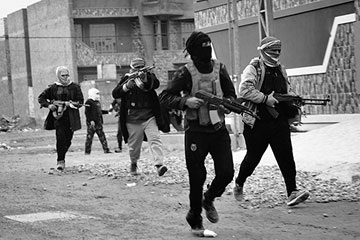
Tribal fighters patrol Fallujah streets on Jan. 5 as the Iraqi government faces off against al-Qaeda forces.
(4 of 6)
The security and services Raqqa's residents received from Baghdadi were accompanied by certain religious strictures. Billboards promoting Islamic law and veils for women blossomed throughout the city. Roving bands of ISIS police plucked cigarettes from the lips of smokers and tore from rearview mirrors the dangling talismans traditionally used to ward off the evil eye--an affront to the true Islam, say the enforcers. Those who spoke out against ISIS's draconian rules were tried in Islamic courts for apostasy, say opposition activists based in Raqqa. Others simply disappeared.
Baghdadi's ability to establish a foothold in Raqqa, one of the capitals of Islam's golden age, has inspired a millenarian fervor among his followers and strengthened his claim to prominence, says a Western aid worker based in Turkey who has close dealings with ISIS representatives. And success has led Baghdadi to publicize his broader ambitions. During Ramadan celebrations in Raqqa in August, ISIS displayed a map that showed a borderless country stretching from the edge of Iran to the southern tip of the Arabian Peninsula and across North Africa--a near re-creation of the 8th century Abbasid caliphate, the first Islamic empire. "At this point Baghdadi is saying, 'We are the real jihadis, we have actually won territory, and we are closer to having a caliphate than any other al-Qaeda group before,'" says the aid worker, who spoke on condition of anonymity to protect his organization from reprisal.
That presents a welcome development for beleaguered al-Qaeda affiliates around the world but also a challenge. Ayman al-Zawahiri, bin Laden's designated successor, still wields influence in the organization, yet his ability to direct operations is compromised by having to live in hiding. As a consequence, affiliates like al-Qaeda in the Islamic Maghreb in North Africa, Somalia's al-Shabab and Yemen's al-Qaeda in the Arabian Peninsula are rising in prominence and vying for leadership roles. However, it is ISIS that has the biggest stage and Baghdadi the most clout. The question is whether his clout is too much for al-Qaeda's old guard, says Seth Jones, a counterinsurgency specialist at the Rand Corp., a security-policy think tank in Washington. "He is the naughty son, the one who keeps pushing the line. For the moment he still has a relationship with his parents in Pakistan, where al-Qaeda central is based, but he is giving them a huge headache."
In May, Zawahiri was forced to publicly intervene in a spat between Baghdadi and his onetime deputy Abu Muhammad al-Jawlani, head of the Syrian al-Qaeda affiliate al-Nusra Front, over Baghdadi's attempt to merge the two organizations. In a letter followed by an audio recording, Zawahiri abolished ISIS and ordered Baghdadi back to Iraq. Baghdadi didn't listen, snapping back in a terse audio recording that ISIS would stay intact. "I have to choose between the rule of God and the rule of Zawahiri, and I choose the rule of God," he said. Almost all the foreign fighters and many of al-Nusra's top commanders defected to ISIS, pledging allegiance to Baghdadi, according to both Jones and Lewis.
